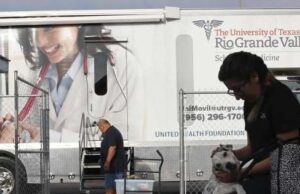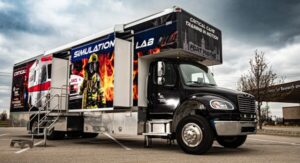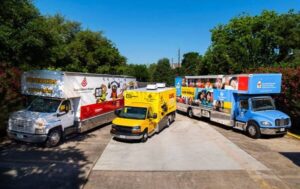How Mobile Health Clinics Can Serve Your Community’s Needs: A Guide for Hospitals — Part 1
A single community can have multiple healthcare needs within various population groups. There are maternal and infant health requirements for both urban and rural women, as well as preventive and dental care needs for school-age children. Every community has homeless populations that are at risk, and there are rural and urban areas that are underserved by the medical community. From construction workers to front-line responders and miners, there are occupational health needs that must be addressed. So, how can a single hospital make a meaningful impact on the people in their community who can’t or refuse to come to them?
Mobile health clinics, also known as mobile medical units, enhance access to healthcare by bringing services directly to individuals in communities where they live and work. They address transportation barriers, serve those who lack adequate insurance, and offer customized care to the specific needs of individual populations.

There is a universal need to meet the diverse healthcare requirements of a community, encompassing medical, dental, diagnostic, women’s health, prenatal, vaccination, behavioral health, substance abuse, and health education services.
- Many populations have cultural differences that require customized services in micro-communities, such as ethnic populations, the homeless, various religious groups, and large businesses.
- Many of whom can be reached at cultural events, which may include fairs, festivals, or other local attractions.
- Mobile medical units meet different populations where they live, work, and play to provide preventative care, instead of the patients commuting to a healthcare center. Visiting them fosters community trust and relationships. When they need to come to the healthcare center for more serious issues, such as surgeries or cancer treatments, they will come to the hospital that runs the mobile clinic program that served them.
- If funding, grants, or the needs in the community change, the vehicles can be retrofitted to change program focus.
What about practitioner education?
Many hospitals have simulation laboratories that mimic real-world healthcare settings where professionals and students practice clinical skills and scenarios in a controlled environment without risking harm to real patients. However, not all hospitals are equipped with sim training, though the demand is increasing. To adequately serve the needs of their community, doctors, nurses, and other practitioners require continuing education and certifications.

Mobile simulation labs are ideal for hospitals that lack simulation facilities and for remote first responders, clinics, and traveling nurses who all require ongoing professional development. Each hospital’s training needs are unique, and your mobile simulation lab should be built to meet the specific needs of your team to reduce travel time and training hours. By providing advanced medical simulation equipment and resources that your outreach requires, you can deliver practical, on-site training that creates competency, confidence, and preparedness.
Whether you’re focusing on critical care, emergency response, or specialized procedures, state-of-the-art mobile medical simulation labs make sure that your staff is ready for any challenge they might face in the hospital or in the field.
6 Key Advantages of Mobile Outreach:
- Utilizing expensive equipment across multiple sites: Mobile units allow you to maximize the use of costly equipment by serving more patients than in a fixed location. Mammography, Nurse Simulation, Ophthalmology, and Audiology are some examples of healthcare services with expensive equipment that can be shared by multiple locations using a mobile unit.
- Professional staff can cover your entire service area: Staff can effectively reach all families in your service area, ensuring broader access to care.
- Identify new sites for fixed clinical facilities: By visiting sites with a mobile unit, you can test market your services. As a particular location shows high demand, you can determine the feasibility of building a permanent clinic.
- Multi-purpose functionality: Mobile units can be adapted to provide various services and can easily change locations and service types economically.
- Seasonal flexibility: Mobile units can adjust their focus and locations according to seasonal needs, such as providing school-based care during the winter and operating at neighborhood centers during the summer.
- Link patients and providers: Mobile units help families establish a provider home with your organization, fostering long-term relationships.
These advantages highlight the flexibility and efficiency of mobile healthcare programs. But how do you establish your program with the community? They all know of your organization, but do they know how much you care? Be a part of their lives, engage in their activities, and meet them where they live, work, shop, and play.
12 Examples of Mobile Health Clinic Engagement — Strengthening Community Connections
Your mobile clinic functions as a dynamic roving billboard, showcasing your organization’s diverse services while reflecting genuine care for the community. Consider these ideas that are being used by your contemporaries:
- Community “Lunch and Learn” Sessions with Local Organizations
Incorporate a “lunch and learn” element to introduce your program to community members and organizations such as churches, chambers of commerce, local businesses, Rotary Clubs, and Kiwanis. This proactive approach fosters trust and provides valuable insight into the unique challenges of the community. - All-in-One Community Engagement Events
Organize service fairs that combine multiple offerings into a single event—medical and dental care in one vehicle, pediatric check-ups, discussions on food insecurity, mammogram awareness, and dental health education. Even if your mobile program doesn’t offer every service, these multifaceted events enhance community outreach and generate positive public relations through education and strategic partnerships. - Collaborations with Food Pantries and Mobile Shower Services
When targeting services for homeless populations, partner with food pantries or mobile shower services to maximize outreach. Alcoholics Anonymous, Narcotics Anonymous, and other behavioral support communities allow partnerships to reach, inform, and support at-risk communities that might not otherwise receive care until they are forced to go to an emergency room. - Comprehensive “Service Fairs” with a Variety of Partners
Invite a broad spectrum of community service providers — behavioral health specialists, case management professionals, insurance enrollment experts, and other mobile healthcare providers — to join your service fairs, creating a one-stop resource for community needs. - Active Participation in Local Chamber of Commerce Meetings
Have your Community Outreach Coordinator engage in local Chamber of Commerce meetings. This participation can expand your patient network and uncover funding opportunities as more local organizations become familiar with your work. - Collaboration with Street Medics

Team up with street medics who often have insight into upcoming urban events that could benefit from the support of your mobile clinic. - Engagement with Schools, Parks, Recreation Centers, and Libraries
Build partnerships with these institutions to expand your community presence. - Leveraging Local Media Partnerships, Podcasters, and Influencers (whatever is current local media)
Connect with local radio stations, newspapers, TV stations, podcasters, and social media influencers to attend their public events, such as outdoor concerts and summer cookouts, enhancing your community visibility. - Unique Collaborations with Bars and Clubs
Some healthcare organizations partner with bars and clubs, offering incentives such as free admission or a complimentary drink in exchange for HIV/STI testing or vaccination, thereby broadening their outreach efforts. - Partnerships with Stores, Churches, and College Organizations
Engage with local grocery stores, religious communities, and college sororities and fraternities to amplify your presence in the community. - Shopping Plaza Collaborations
Collaborate with shopping centers that feature local businesses, such as barbers offering complimentary haircuts or gift shops providing discount coupons, to enhance the value of visiting your mobile clinic. - Supporting the Incarcerated Community
Establish relationships with local jails, prisons, and half-way houses to reach individuals on release, who often lack healthcare insurance, to address critical gaps in their provision of health services.
Community partnerships form the backbone of any successful mobile clinic program. Whether participating in health fairs or supporting back-to-school events, actively engaging with your community should remain a core focus of your initiative. Additionally, maximize your outreach efforts by leveraging social media and email marketing to keep both community partners and patients informed and engaged.
Download our white paper to learn how to be successful with your mobile health clinic!



